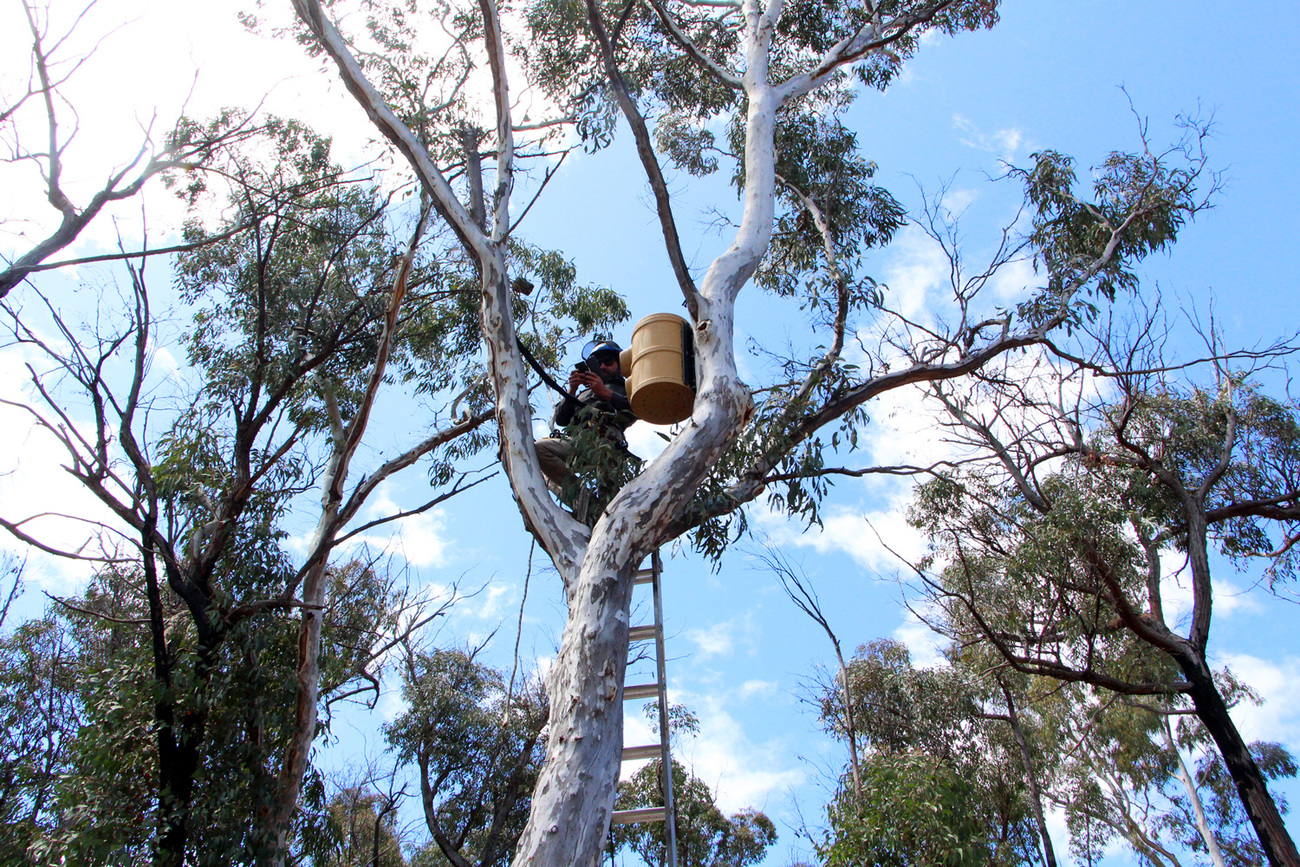Updates
How IFAW has helped animals and people during the Ukraine crisis
Learn morebuild it and they will come – promising hollows for bushfire-impacted wildlife

The endangered greater glider has been spotted for the first time at a wildlife sanctuary destroyed by the Black Summer bushfires.
Two Thumbs Wildlife Trust Sanctuary was devasted by bushfires on January 23, 2020, but two and a half years on, there are promising signs wildlife is returning to the once biodiverse hotspot.
The catastrophic bushfires wiped out natural hollows found in trees on the property, leaving many animals homeless with nowhere to go. IFAW (International Fund for Animal Welfare) has been working with Habitat Innovation and Management to install an initial 25 Habitech nest boxes for different species on the 700-plus-hectare property near Cooma, New South Wales.
Nest boxes mimic natural hollows found in trees and the innovative Habitech design is made from composite material, is modular, highly insulated, recyclable, weather resistant, and designed to last decades.
The nest boxes at Two Thumbs Wildlife Trust specifically target the endangered gang-gang cockatoo and several glider species, including the endangered greater glider and yellow-bellied glider.
During preliminary surveys of the property, a greater glider was spotted by Habitat Innovation and Management ecologists — just weeks after the nation’s largest gliding mammal was up-listed to Endangered under the Australian Government’s Environment Protection and Biodiversity Conservation Act 1999.
“Greater gliders are extremely sensitive to fire so to spot one is a huge win for this bushfire-impacted property and really exciting especially given they’re now listed as endangered,” Habitat Innovation and Management Director Carl Tippler said.
“Two Thumbs Wildlife Trust is home to a plethora of endangered arboreal mammals and birds, many of which would have been left without hollows after the bushfires. These nest boxes are integral for native fauna to recover.”
IFAW Wildlife Campaign Manager Josey Sharrad said this is the first stage of recovery support for the sanctuary and with climate change increasing the intensity and frequency of extreme weather events, anything we can do to better protect our wildlife is vital.
“These animals were left homeless after the fires and we’re building hollows so they can return to the place they once called home. Birds and gliders have already been captured on camera using the nest boxes. If you build it, they will come,” Ms Sharrad said.
“It is heartening to see the sanctuary slowly coming back to life and getting a helping hand from us.
“We’re already seeing other endangered animals return to this incredibly diverse property including koalas – which gives us hope for the future of those species and for this sanctuary to return to what it once was.”
Natural hollows for smaller animals take up to 100 years to develop in a eucalypt tree while hollows for larger animals like greater gliders take up to 200 years or more to form, but these artificial hollows provide an immediate ready-to-move-in home for animals.
They provide a stable microclimate which is vital for native hollow-dependent fauna especially parrots and micro-bats.
Two Thumbs Wildlife Trust Sanctuary owner James Fitzgerald said thousands of hollow trees were destroyed on the property, which is on Ngarigo country, during the Black Summer bushfires.
“One of the problems with bushfires is the fire gets in hollows and totally destroys them, creating a big absence of hollows for wildlife,” Mr Fitzgerald said.
“So much was lost at the sanctuary. It was uplifting to see the endangered greater glider in this post-bushfire landscape and through these nest boxes, we’re creating homes that were lost in the fires.”
ENDS
Photos and videos available HERE
Press Contact
IFAW Australia
Dominica Mack
m: 0460 432 901
e: dmack@ifaw.org
Every problem has a solution, every solution needs support.
The problems we face are urgent, complicated and resistant to change. Real solutions demand creativity, hard work and involvement from people like you.
Unfortunately, the browser you use is outdated and does not allow you to display the site correctly. Please install any of the modern browsers, for example:
Google Chrome Firefox Safari